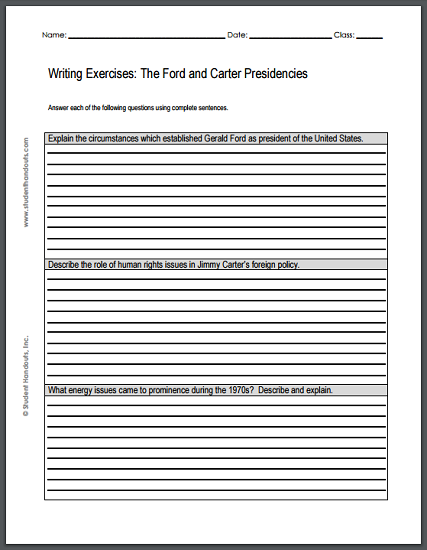| Writing Exercises on the Ford and Carter Presidencies |
|---|
| www.studenthandouts.com ↣ U.S. History ↣ Decades of Change ↣ Worksheets |
| Answer each of the following questions using complete sentences. 1. Explain the circumstances which established Gerald Ford as president of the United States. 2. Describe the role of human rights issues in Jimmy Carter’s foreign policy. 3. What energy issues came to prominence during the 1970s? Describe and explain. |
 |
    |
|
Click here to print (PDF file). Answers will vary.
Gerald Ford became President of the United States under unique and unprecedented circumstances. Here is a detailed explanation of the events leading to his presidency. Background: The Watergate scandal, which began with the break-in at the Democratic National committee headquarters in 1972, implicated high-ranking officials in President Richard Nixon's administration. As investigations unfolded, it became clear that there was a cover-up involving senior officials, leading to widespread calls for accountability. Resignation of Spiro Agnew: Vice President Spiro Agnew resigned on October 10, 1973, after being charged with tax evasion and accepting bribes while serving as Governor of Maryland. His resignation was part of a plea deal to avoid jail time. This created a vacancy in the office of the Vice President. Nomination of Gerald Ford as Vice President: President Nixon, seeking to restore credibility and stability to his administration, nominated Gerald Ford, the House Minority Leader and a well-respected congressman from Michigan, to replace Agnew. Ford was known for his integrity and bipartisan appeal. The Senate confirmed Ford by a vote of 92-3, and the House of Representatives confirmed him by a vote of 387-35. He was sworn in as Vice President on December 6, 1973. Nixon's Impeachment Proceedings: As the Watergate scandal deepened, it became clear that President Nixon faced likely impeachment. The House Judiciary committee approved articles of impeachment against Nixon for obstruction of justice, abuse of power, and contempt of Congress. Nixon's Resignation: Facing inevitable impeachment and removal from office, Nixon chose to resign. On August 8, 1974, he announced his resignation in a televised address to the nation. His resignation became effective at noon on August 9, 1974. Ford's Ascendancy to the Presidency: Upon Nixon's resignation, Gerald Ford automatically became President, as specified by the Constitution. Ford took the oath of office on August 9, 1974, stating in his inaugural speech, "Our long national nightmare is over." Presidential Pardon of Nixon: One of Ford's first and most controversial acts as President was issuing a full pardon to Nixon on September 8, 1974, for any crimes he might have committed while in office. Ford believed the pardon was necessary to help the nation move forward, but it drew significant criticism and damaged his popularity. Gerald Ford's rise to the presidency was unique in American history. He was the first and only person to become President without being elected to the office of President or Vice President, underscoring the extraordinary nature of the circumstances surrounding his ascent. |
| www.studenthandouts.com ↣ U.S. History ↣ Decades of Change ↣ Worksheets |








